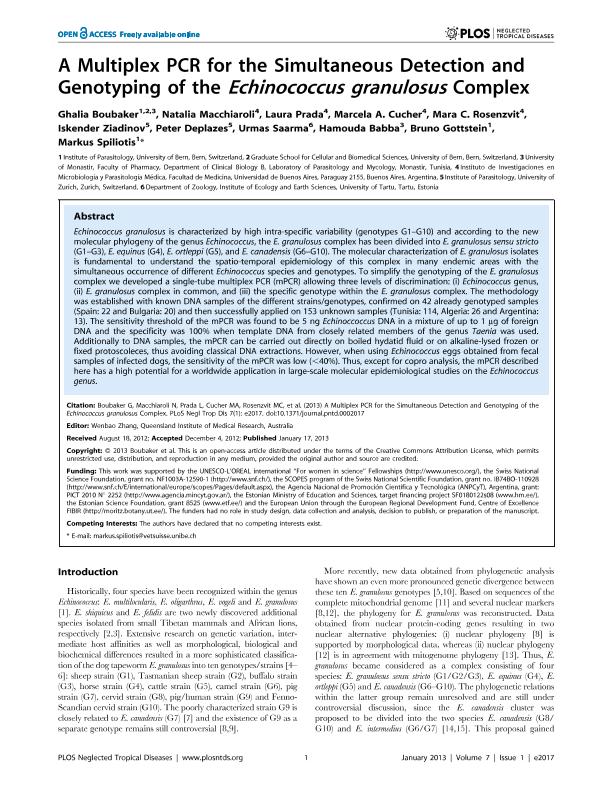Artículo
Echinococcus granulosus is characterized by high intra-specific variability (genotypes G1–G10) and according to the new molecular phylogeny of the genus Echinococcus, the E. granulosus complex has been divided into E. granulosus sensu stricto (G1–G3), E. equinus (G4), E. ortleppi (G5), and E. canadensis (G6–G10). The molecular characterization of E. granulosus isolates is fundamental to understand the spatio-temporal epidemiology of this complex in many endemic areas with the simultaneous occurrence of different Echinococcus species and genotypes. To simplify the genotyping of the E. granulosus complex we developed a single-tube multiplex PCR (mPCR) allowing three levels of discrimination: (i) Echinococcus genus, (ii) E. granulosus complex in common, and (iii) the specific genotype within the E. granulosus complex. The methodology was established with known DNA samples of the different strains/genotypes, confirmed on 42 already genotyped samples (Spain: 22 and Bulgaria: 20) and then successfully applied on 153 unknown samples (Tunisia: 114, Algeria: 26 and Argentina: 13). The sensitivity threshold of the mPCR was found to be 5 ng Echinoccoccus DNA in a mixture of up to 1 µg of foreign DNA and the specificity was 100% when template DNA from closely related members of the genus Taenia was used. Additionally to DNA samples, the mPCR can be carried out directly on boiled hydatid fluid or on alkaline-lysed frozen or fixed protoscoleces, thus avoiding classical DNA extractions. However, when using Echinococcus eggs obtained from fecal samples of infected dogs, the sensitivity of the mPCR was low (<40%). Thus, except for copro analysis, the mPCR described here has a high potential for a worldwide application in large-scale molecular epidemiological studies on the Echinococcus genus. The dog tapeworm Echinococcus granulosus (E. granulosus) is a cosmopolitan parasite. The adult worms reside in the small intestine of their definitive hosts (dogs). Infective eggs are shed with the feces into the environment and are orally ingested by intermediate hosts where they develop into the metacestode (larval) stage, causing cystic echinococcosis (CE) in humans and livestock. Ten intraspecific genotypes of E. granulosus (G1 to G10) have been reported from different intermediate host species. Based on the recently established molecular phylogeny, E. granulosus is now considered a complex consisting of four species: E. granulosus sensu stricto (G1/G2/G3), E. equinus (G4), E. ortleppi (G5) and E. canadensis (G6–G10). Simple and highly discriminative molecular epidemiological approaches are needed to explore dynamics, life cycle patterns, and the pathogenicity of the members of this complex. We here introduce a one-step multiplex PCR (mPCR) protocol for the genotyping and discrimination of the different members of the E. granulosus complex, allowing three levels of discrimination: (i) Echinococcus genus, (ii) E. granulosus complex, and (iii) genetic variants within the E. granulosus complex. The relatively complicated task of E. granulosus complex speciation and genotyping is clearly simplified by mPCR, and this technique therefore represents a useful tool for routine practice. (Author Summary)
A multiplex PCR for the simultaneous detection and genotyping of the Echinococcus granulosus complex
Boubaker, Ghalia; Macchiaroli, Natalia ; Prada, Laura Cecilia
; Prada, Laura Cecilia ; Fernández, Cecilia
; Fernández, Cecilia ; Rosenzvit, Mara Cecilia
; Rosenzvit, Mara Cecilia ; Ziadinov, Iskender; Deplazes, Peter; Saarma, Urmas; Babba, Hamouda; Gottstein, Bruno; Spiliotis, Markus
; Ziadinov, Iskender; Deplazes, Peter; Saarma, Urmas; Babba, Hamouda; Gottstein, Bruno; Spiliotis, Markus
 ; Prada, Laura Cecilia
; Prada, Laura Cecilia ; Fernández, Cecilia
; Fernández, Cecilia ; Rosenzvit, Mara Cecilia
; Rosenzvit, Mara Cecilia ; Ziadinov, Iskender; Deplazes, Peter; Saarma, Urmas; Babba, Hamouda; Gottstein, Bruno; Spiliotis, Markus
; Ziadinov, Iskender; Deplazes, Peter; Saarma, Urmas; Babba, Hamouda; Gottstein, Bruno; Spiliotis, Markus
Fecha de publicación:
01/2013
Editorial:
Public Library of Science
Revista:
Neglected Tropical Diseases
ISSN:
1935-2735
Idioma:
Inglés
Tipo de recurso:
Artículo publicado
Clasificación temática:
Resumen
Palabras clave:
One-Vial
,
Single-Tube
,
Multiplex
,
Pcr
,
Detection
,
Genotyping
,
Genotype
,
Cystic
,
Echinococcosis
,
Echinococcus
,
Granulosus
,
Sensu Stricto
,
Equinus
,
Ortleppi
,
Intermedius
,
Canadensis
,
Multilocularis
,
Echinococcus Genus
,
Granulosus Complex
,
Boiled
,
Hydatid Fluid
,
Alkaline-Lysis
,
Protoscoleces
,
Protoscolex
Archivos asociados
Licencia
Identificadores
Colecciones
Articulos(IMPAM)
Articulos de INSTITUTO DE INVESTIGACIONES EN MICROBIOLOGIA Y PARASITOLOGIA MEDICA
Articulos de INSTITUTO DE INVESTIGACIONES EN MICROBIOLOGIA Y PARASITOLOGIA MEDICA
Citación
Boubaker, Ghalia; Macchiaroli, Natalia; Prada, Laura Cecilia; Fernández, Cecilia; Rosenzvit, Mara Cecilia; et al.; A multiplex PCR for the simultaneous detection and genotyping of the Echinococcus granulosus complex; Public Library of Science; Neglected Tropical Diseases; 7; 1; 1-2013; 1-13; e2017
Compartir
Altmétricas



